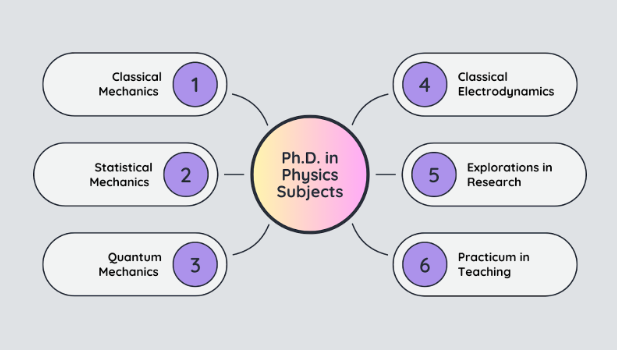Breaking the Limits: How a Ph.D. in Physics can Change the Way You See the World

Blog / January 28, 2025
Ph.D. in PhysicsPh.D. in Physics Eligibility“We are stardust brought to life, then empowered by the universe to figure itself out—and we have only just begun”- Neil deGrasse Tyson
When you gaze at the night sky, do you ever wonder about the sparkling stars, distant galaxies, or if life exists elsewhere in the universe?
Astrophysics, the fascinating branch of physics that comprehends the universe- offers answers to some of humanity’s biggest questions. Whether you are a young budding dreamer with an insatiable curiosity or simply curious to decipher the universe’s mysteries, a Ph.D. in Physics can help you turn your passion for the stars into a reality. But the question arises: Is the Ph.D. degree in Physics worth it? The statistics will say it all.

The Blueprint
According to the data shared by the BLS, the demand for physicists and astronomers is anticipated to increase by 7 percent between 2023 and 2033, which is faster than many other occupations. These professionals typically need a Ph.D. degree to bag jobs in academia and research. Hence, earning a doctoral degree could be a game changer.
Astrophysics - The Cosmic Story Unfolds
Astrophysics, a branch of physics, propels the physical properties of celestial objects and the universe as a whole, from the enigmatic void of black holes to the blazing birth of stars to dark matter and dark energy and exoplanets.
It amalgamates the principles of physics and mathematics to explain phenomena such as The Big Bang- the moment when time and space began, widening the universe from an infinitely dense point, gravitational waves- ripples in space-time caused by violent cosmic events, etc.
Climbing the Ladder to Astrophysics
In order to enter astrophysicist practice, one should complete an undergraduate degree, followed by a postgraduate degree and then finally the doctorate level degree in physics.
- An undergraduate degree provides a solid foundation of mathematics and physics.
- A postgraduate degree will give you advanced studies in a deeper, more interesting image of astrophysics with many specialized courses and research projects.
- The Ph.D. will allow you to finally complete research and will, of course, enable you to contribute to scientific discoveries.
Ph.D. in Physics Eligibility
To be eligible for Pa h.D. in Physics, a student needs to meet the following eligibility criteria that are mentioned below.
- Educational Qualification
Master’s degree with a minimum aggregate score of 50-60% in any field or specialization.
- Entrance Requirements
Some renowned universities require entrance exams or interviews for admission. Therefore, a solid score in national examinations like CSIR-UGC NET-JRF, DBT-JRF, GATE-JRF, JEST, ICMR JRF, NBHM, CAT, GRE, GMAT, or equivalent may exempt the written test.
The Ph.D. in Physics Duration
A Ph.D. in Physics takes four to five years to complete. In the first two years, scholars complete advanced coursework followed by the researcher in a chosen field, for example, astrophysics. However, the last two years have often been dedicated to dissertation research.
Discover the Unknown with a Ph.D. in Physics with a Focus on Astrophysics @ Shiv Nadar University (Institution of Eminence)
Housed under Shiv Nadar University, the School of Natural Sciences offers a diverse program, a Ph.D. in Physics curated to serve a wide range of research interests to aspiring students. At the university, more than half of research projects are multidisciplinary in nature, compiling integrations in various departments in the School of Natural Sciences and schools and research centers.
Ph.D. in Physics Subjects
A Ph.D. in Physics syllabus includes an array of subjects, ranging from classical mechanics to high-energy physics & beyond. These subjects equip scholars’ minds with a deep knowledge of the fundamental principles of physics, which prepares them to conduct research in their varied areas of interest. In addition, some of the common Ph.D. Physics subjects are:
- Classical Mechanics
- Statistical Mechanics
- Quantum Mechanics
- Classical Electrodynamics
- Explorations in Research
- Practicum in Teaching
- Ph.D. Thesis
Areas of Research at Shiv Nadar University
- Experimental and Theoretical Condensed Matter Physics and Materials Physics
- Experimental and Theoretical Soft Matter Physics
- Theoretical High Energy Physics
- Mathematical and Statistical Physics
- Cosmology and Astrophysics
Epilog
Astrophysics is more than a topic; rather, it is an adventure via the universe’s greatest mysteries. If you find yourself captivated by the twinkling stars, far-off galaxies, etc., a Ph.D. in Physics could be the perfect way to turn your astrophysics dreams into reality. So, gear up to explore the cosmos and carve your own path among the stars. Apply now at Shiv Nadar University!